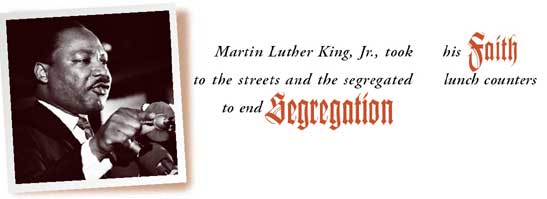Faith And Social Justice
David A. Pendleton July/August 2004
Getting your Trinity Audio player ready...
Separation of church and state means a lot of things. But it does not mean that the faithful have no voice in the public square. It certainly does not relieve believers from urging government to act with wisdom, justice, and righteousness. And it clearly should not bar personal involvement in matters of law and public policy.
The United States Constitution is the highest law in this land. In two different places this most authoritative of legal documents has clauses relating to religion. The first appears in Article VI in the actual body of the original Constitution ("no religious test shall ever be required as a qualification to any office or public trust under the United States"). The second place in the Constitution where religion appears is at the very start of the First Amendment, which was added to our Constitution in 1791 as part of the Bill of Rights. One clause guarantees that religion is not to be established by the government ("Congress shall make no law respecting an establishment of religion"); the other clause guarantees the free exercise of religion ("or prohibiting the free exercise thereof "). The Constitution in this way implicitly recognizes that government and religion are best served when they are allowed to operate freely in their separate spheres. The church should neither be a tool of government nor lord it over government. Initially these clauses operated as a check only on Congress's powers, but subsequently these clauses were applied to the respective states. Thus religious freedom was secured against all levels of government.
Unfortunately, there are those who have felt that separation of church and state means that there is no proper role for involvement in public life by those who have religious beliefs. This was never the intent of the Constitution or its framers.

Christians have come a long way over the past few decades. Today we not only recognize that one can be a Christian lawyer, but virtually all Christian denominations regularly consult lawyers and rely on them to ensure that we have all the t's crossed and the i's dotted. Though years ago in a Christian high school I received advice against pursuing law, students there now can find excellent advice on prelaw studies and can enter internships with government officials. In fact, students can intern in the legal counsel offices at my church's national and international headquarters. This is true for many denominations.
Of course, the ambivalence concerning the juxtaposition of law, politics, and religion is shared not only by believers but also by nonbelievers.
Over the years many hostile to faith have argued against involvement in lawmaking or politics by believers. Christians, they suggest, should just stick to church work.
Devoting one's life and energy to the work of the gospel is biblical (cf. Matthew, chapter 28). Yet we ought to be careful about discouraging any group of citizens from involvement in the lawmaking process simply because they have religious beliefs.
Conservative columnist Cal Thomas recently published some provocative comments on this topic. He wrote that "the Christian church was intended to be, not a hierarchy, but a 'lowerarchy.' As Jesus instructed His disciples when sending them out to share His redemptive message: 'Do not take along any gold or silver or copper in your belts; take no bag for the journey, or extra tunic, or sandals or a staff; for the worker is worth his keep' (Matthew 10:9, 10, NIV).* The emphasis was on making disciples, not persuading Caesar about their point of view."
Thomas is correct in arguing that the church was never primarily an instrument of temporal authority or societal change. The emphasis of the church was to save souls for eternity and to point people to a King and kingdom not of this world. But the tenor of his article can easily lead one to think that social or political involvement is not appropriate if you are a Christian. I don't think this was his belief, but even if it were, Thomas does not have the last word on this topic.
Consider that the Nicodemus mentioned in the New Testament was an important government official. Consider that the centurion who went to Jesus seeking healing for his servant was an important government official. Consider that the kings of Israel were important government officials.
Undoubtedly, there is a role of involvement for believers to play in the public sphere. People of faith, simply because of and by virtue of their faith, cannot be excluded from the practice of law or the legislative process. We Christians believe that we have been called to be in the world but not of the world. Surely this calls for participation, not withdrawal. In fact, it calls for concerted participation that is true to our Christian faith.
This certainly does not mean that we will work for a theocracy. But it does mean that we are to be salt and light wherever we may find ourselves—even, and perhaps especially, if we find ourselves serving in a king's court, as did Daniel; or tasked with saving a people from famine, as did Joseph; or called to serve "for such a time as this," as did Esther.
King David of the Old Testament was a noted shepherd and psalmist. But he was also a skilled administrator, gifted ruler, and great, if somewhat controversial, king. The history of the Jewish people records his seeking to rule consistently with God's will. One passage is reminiscent of the shepherd who became king: "He who rules over men must be just, ruling in the fear of God" (2 Samuel 23:3, NKJV).
Article Author: David A. Pendleton
David A. Pendleton has served as a schoolteacher, college instructor, trial lawyer elected state legislator, and policy advisor to a state governor, and now adjudicates workers' compensation appeals in Honolulu, Hawaii.